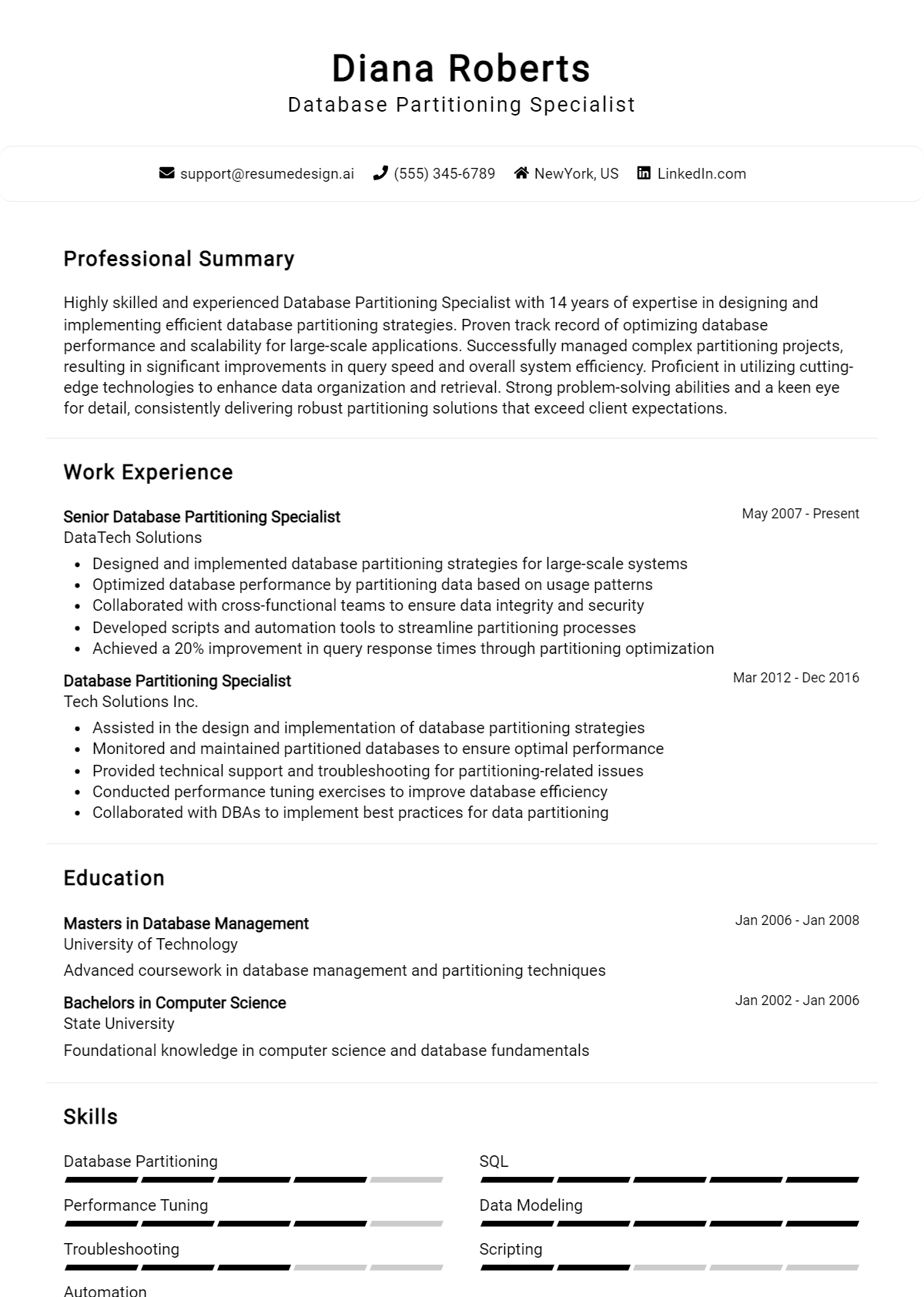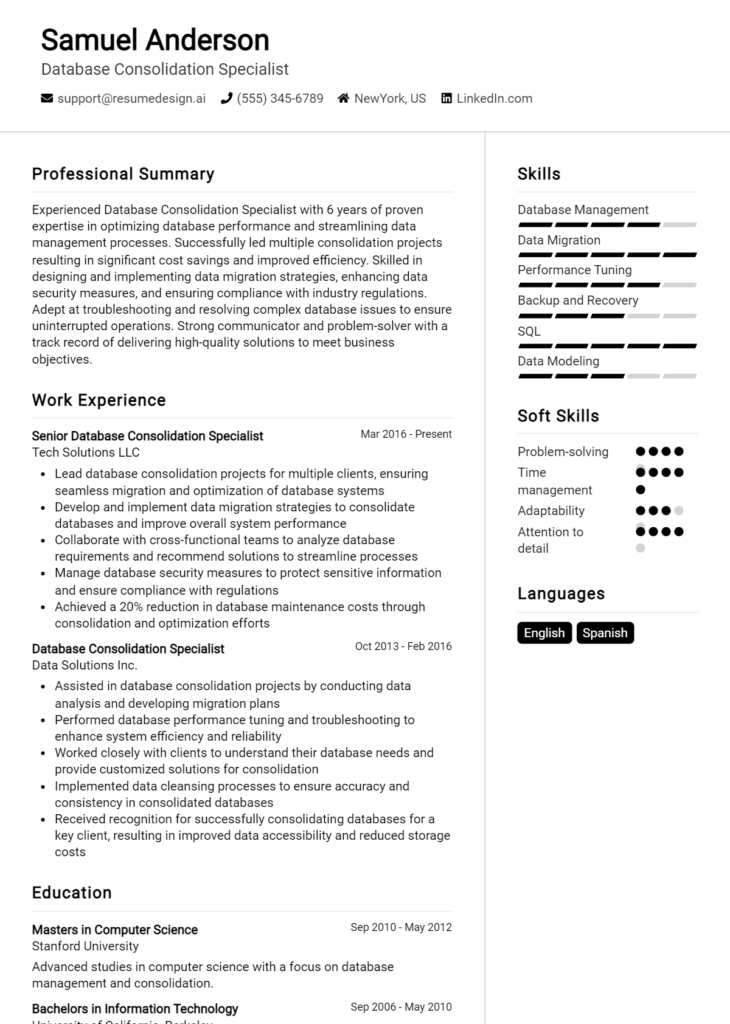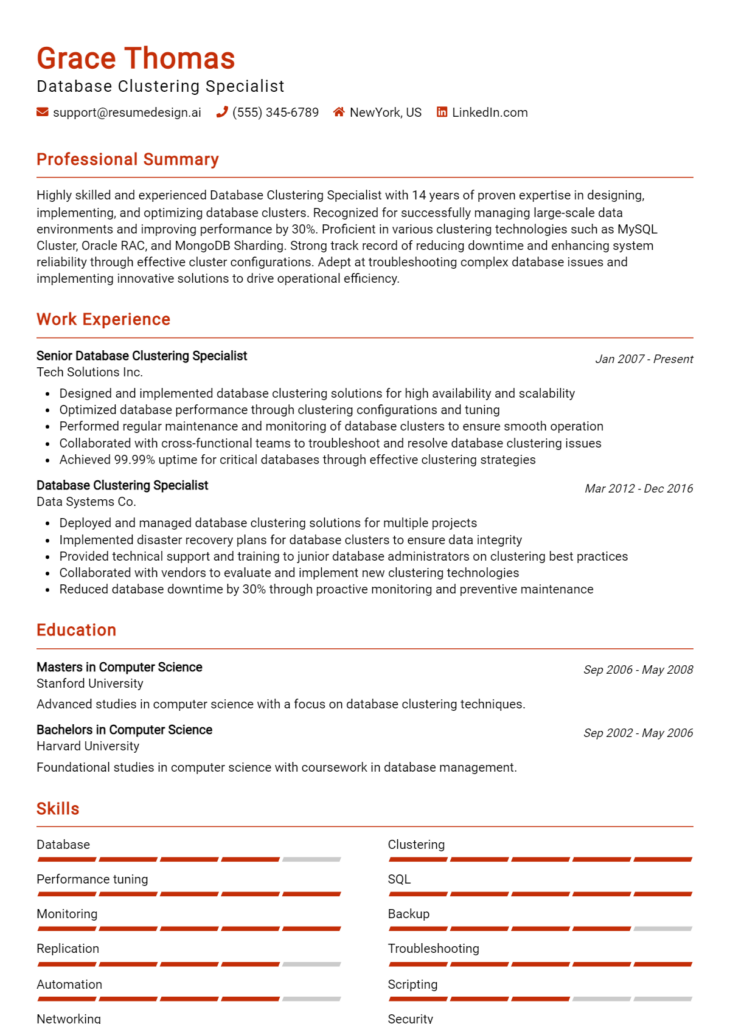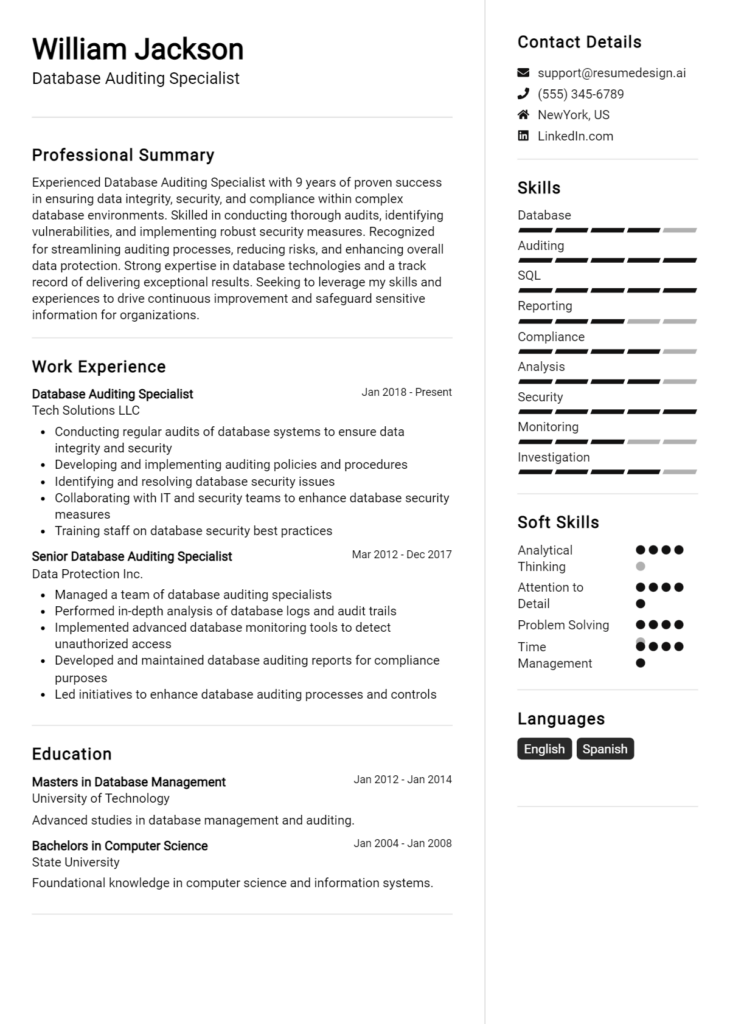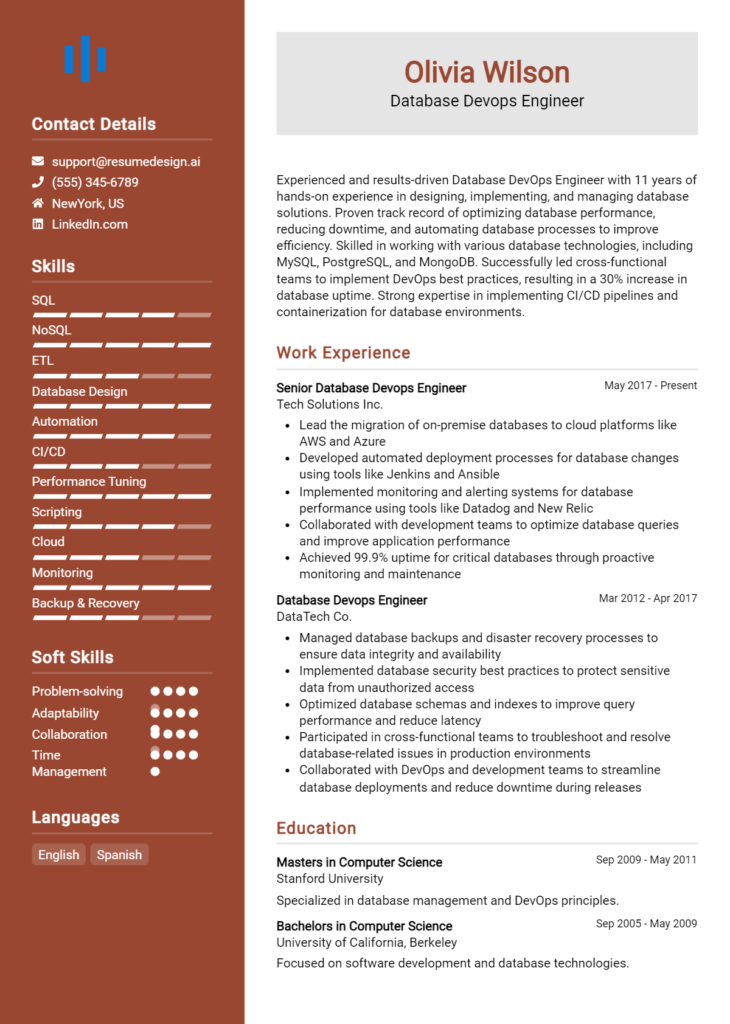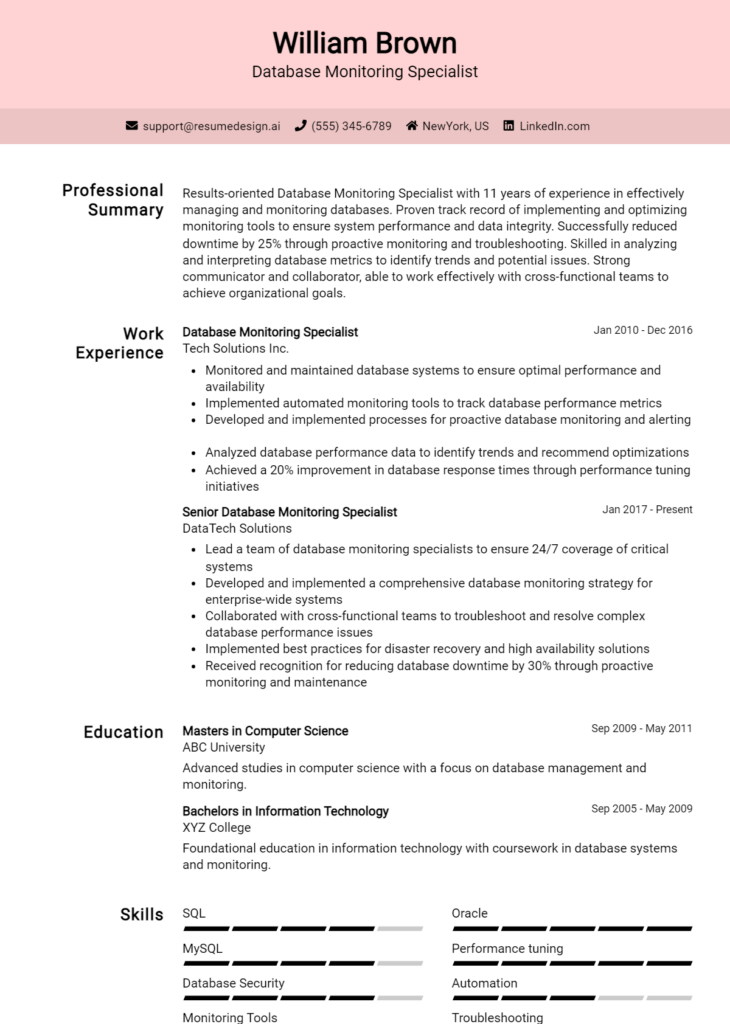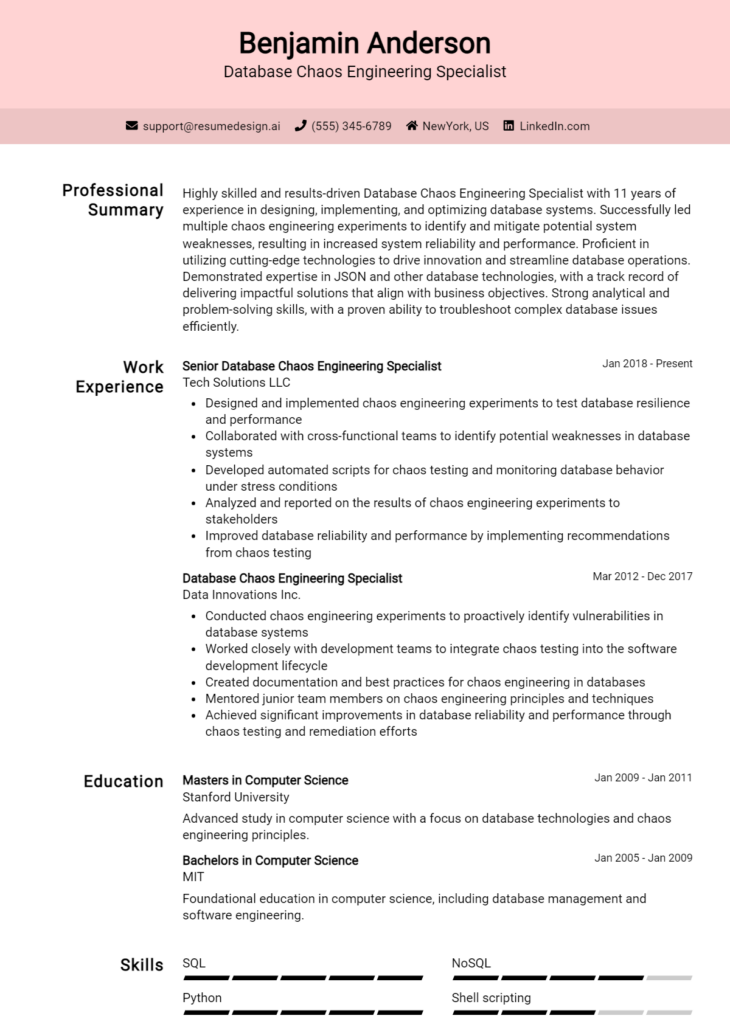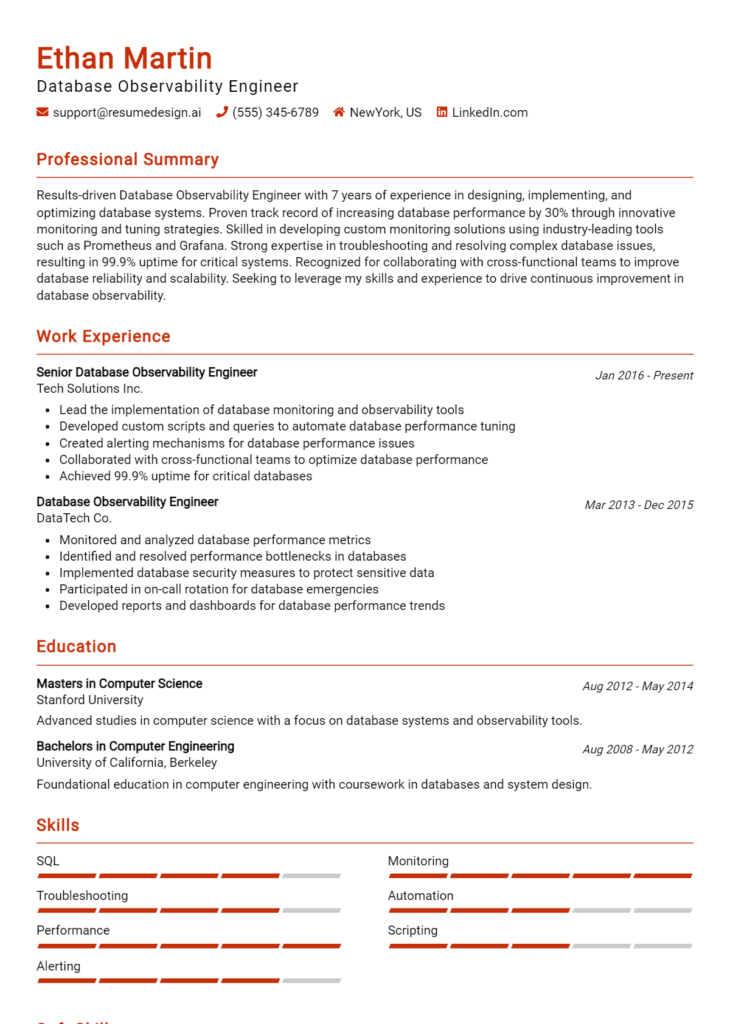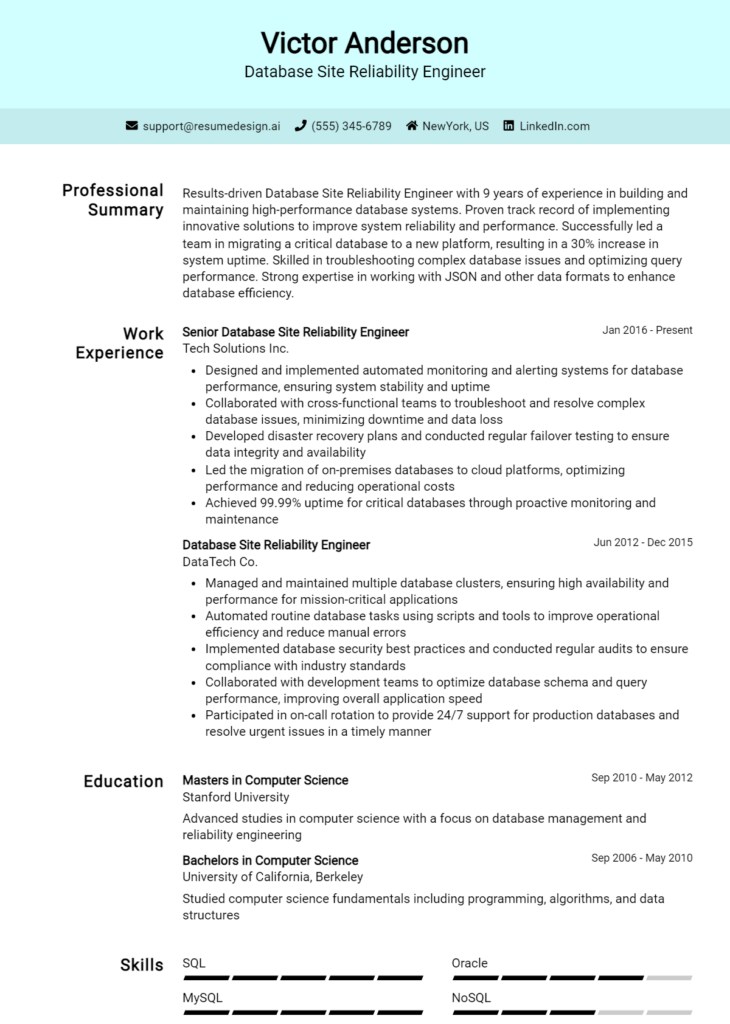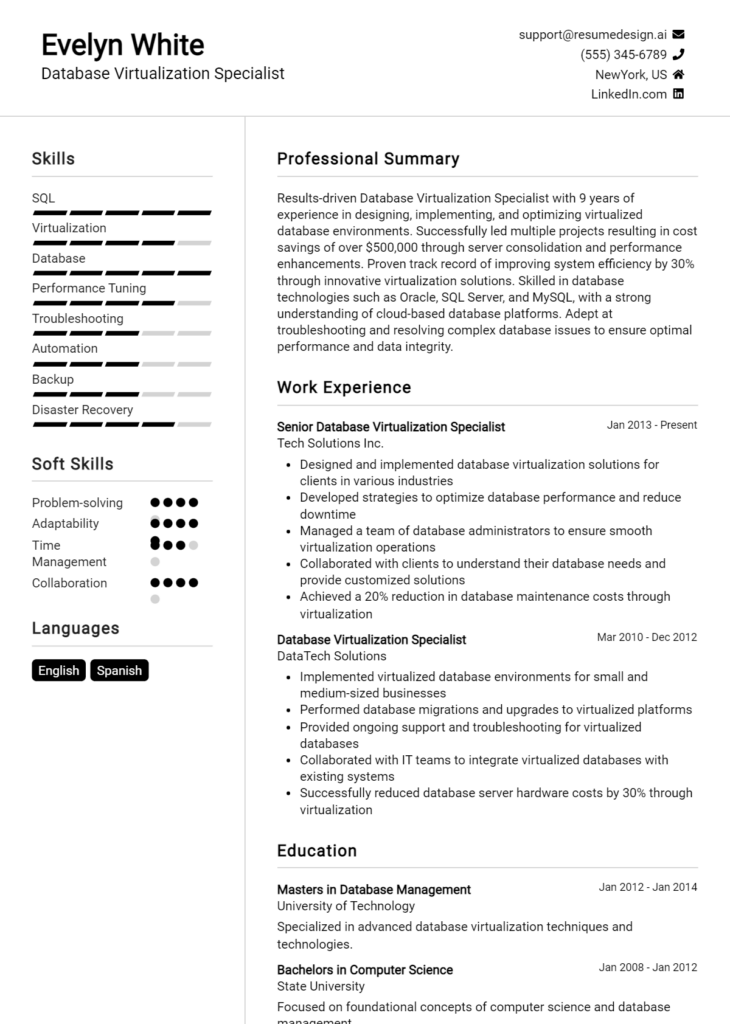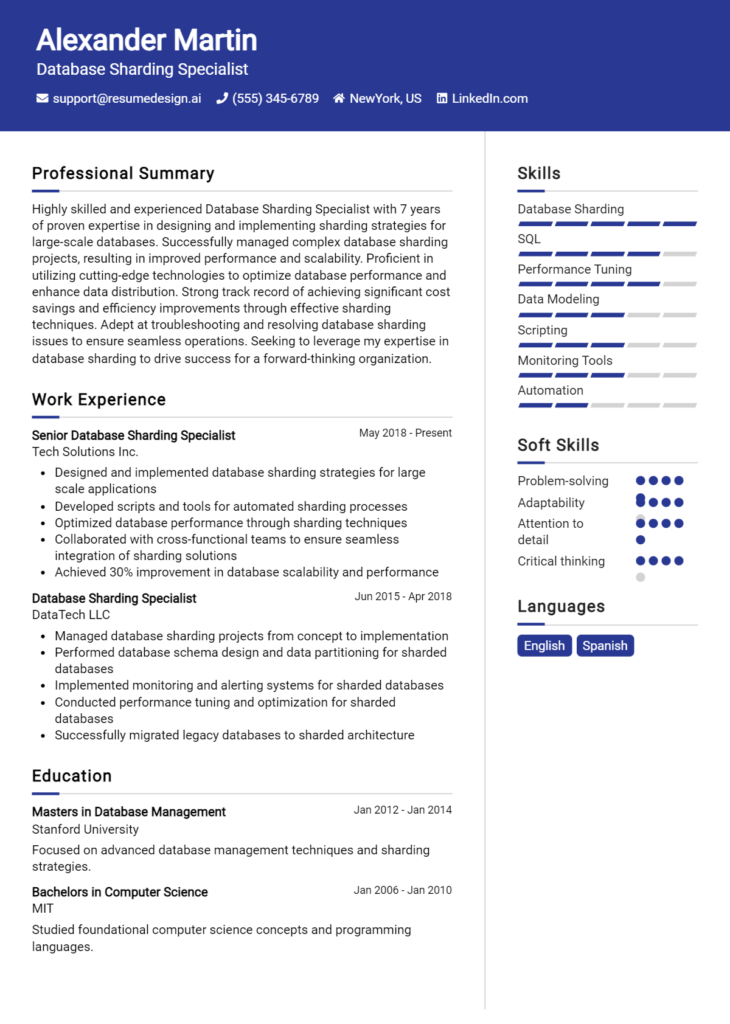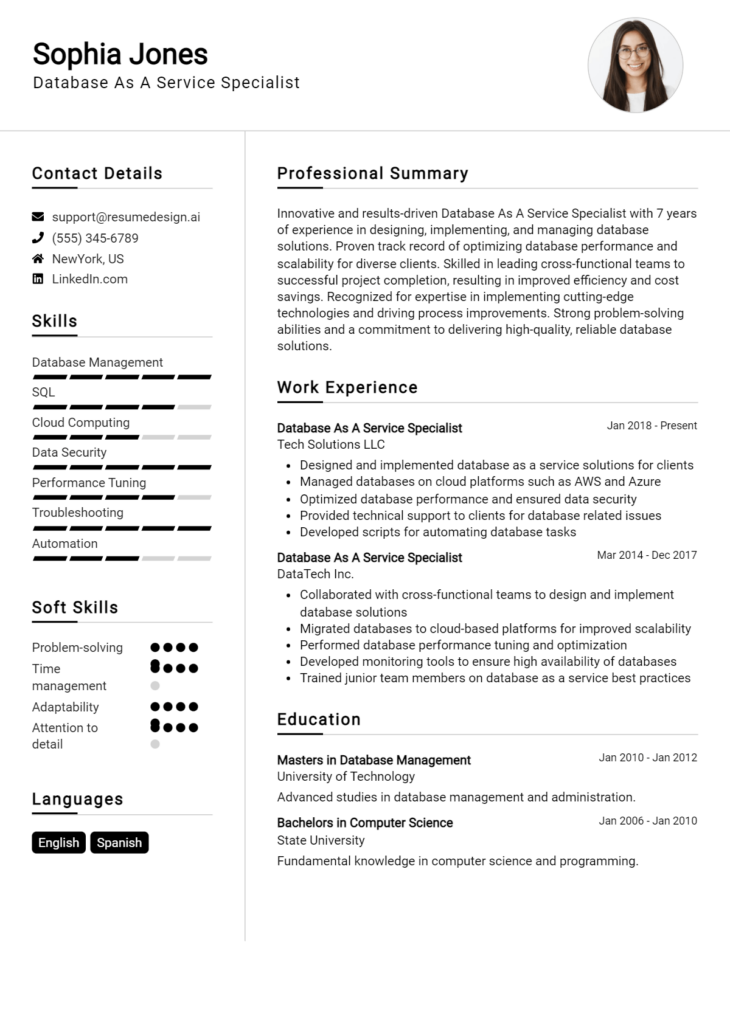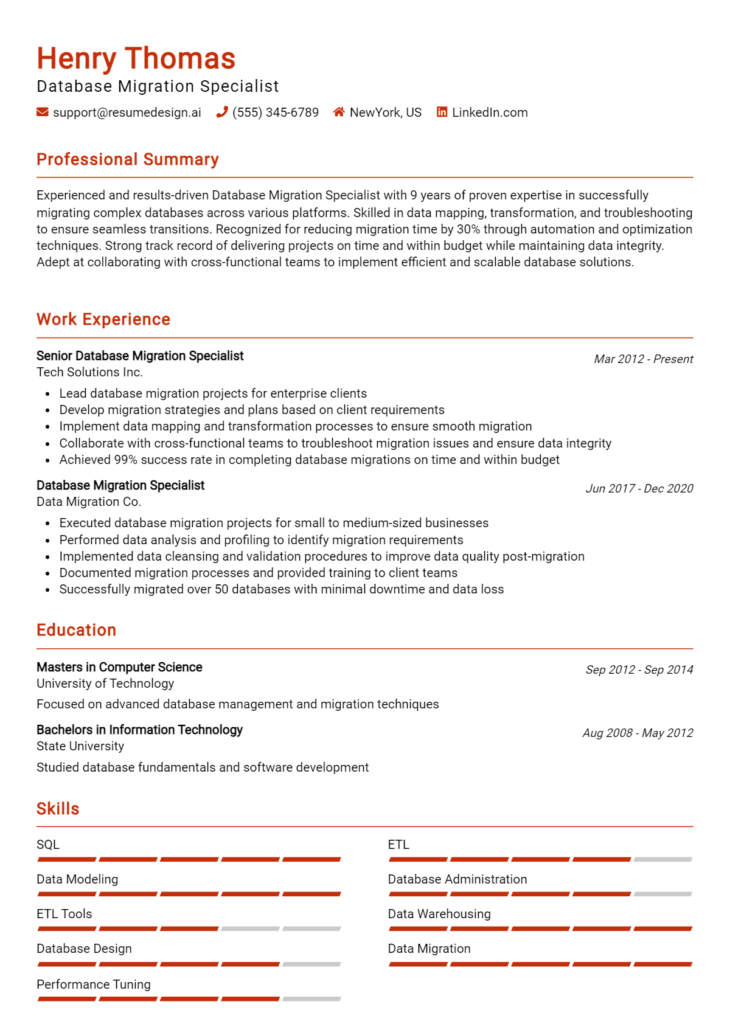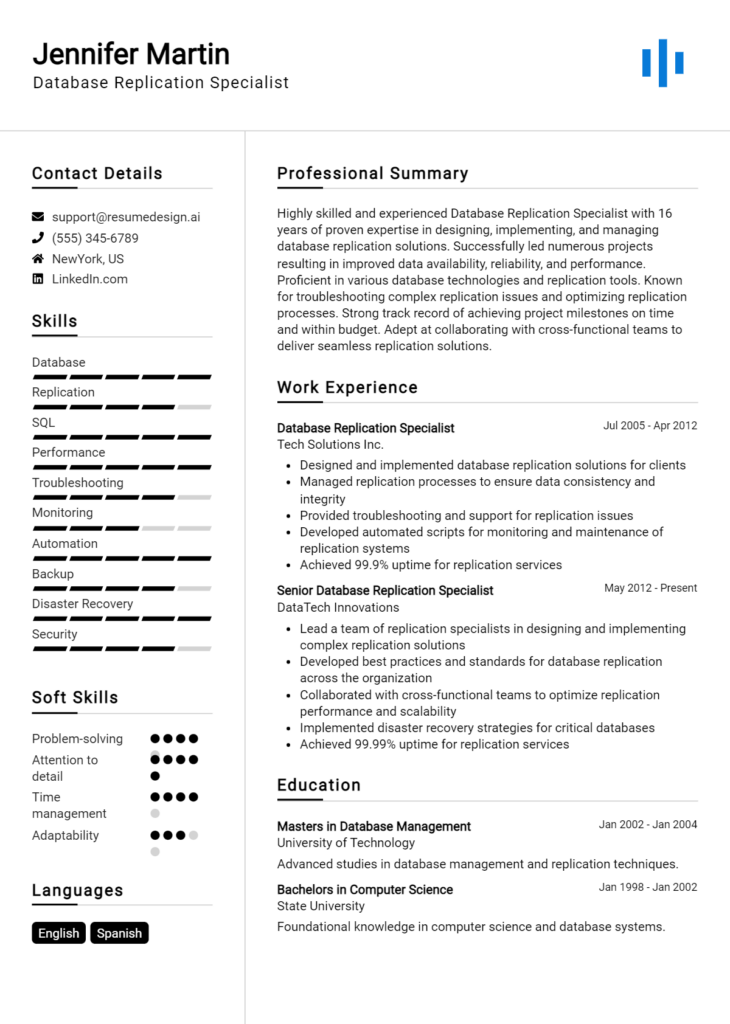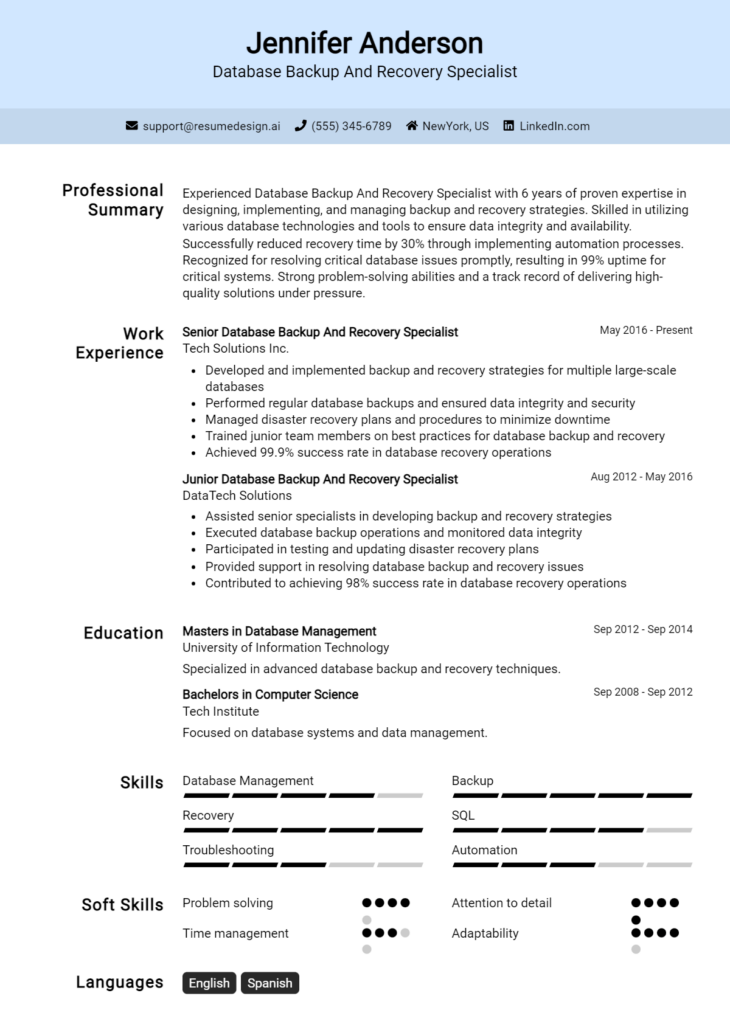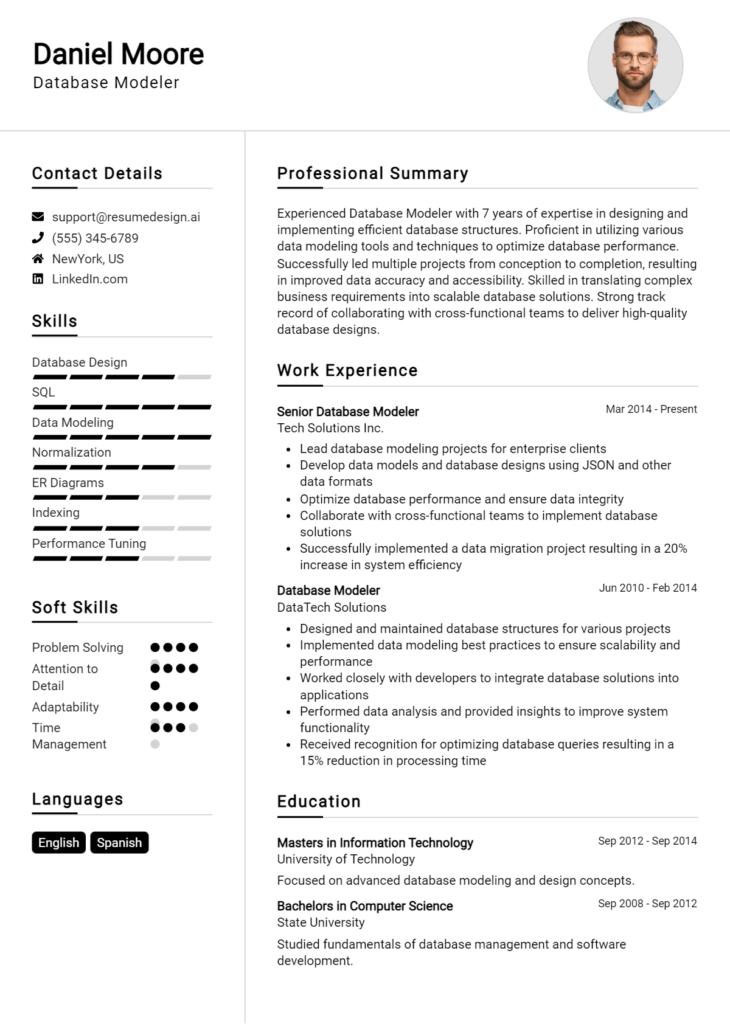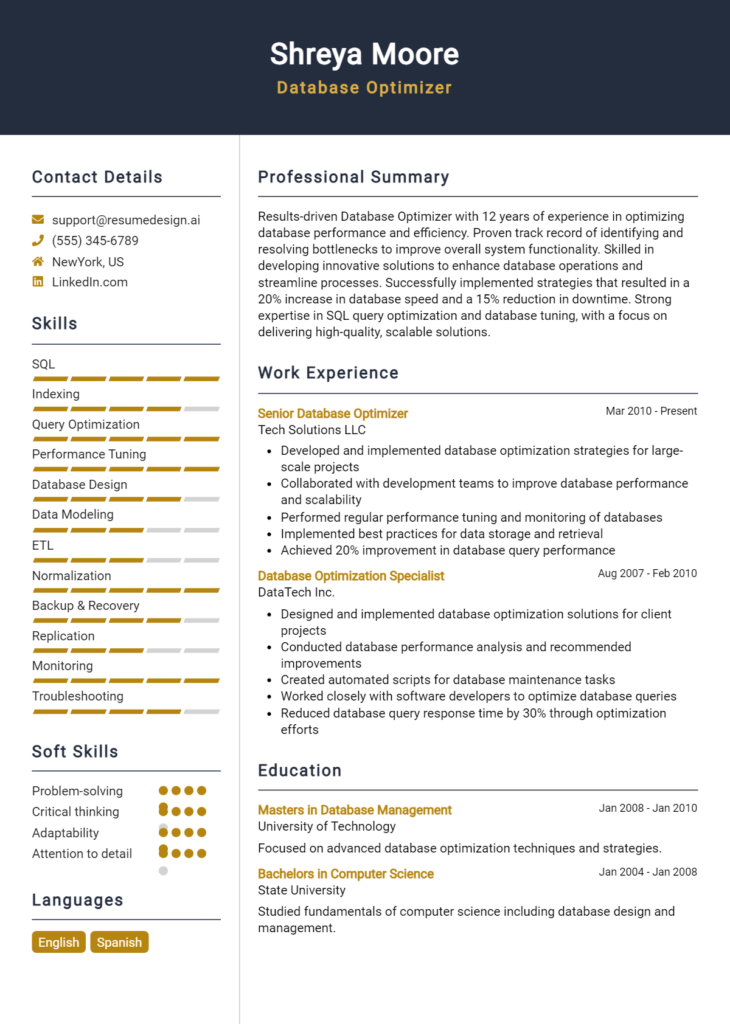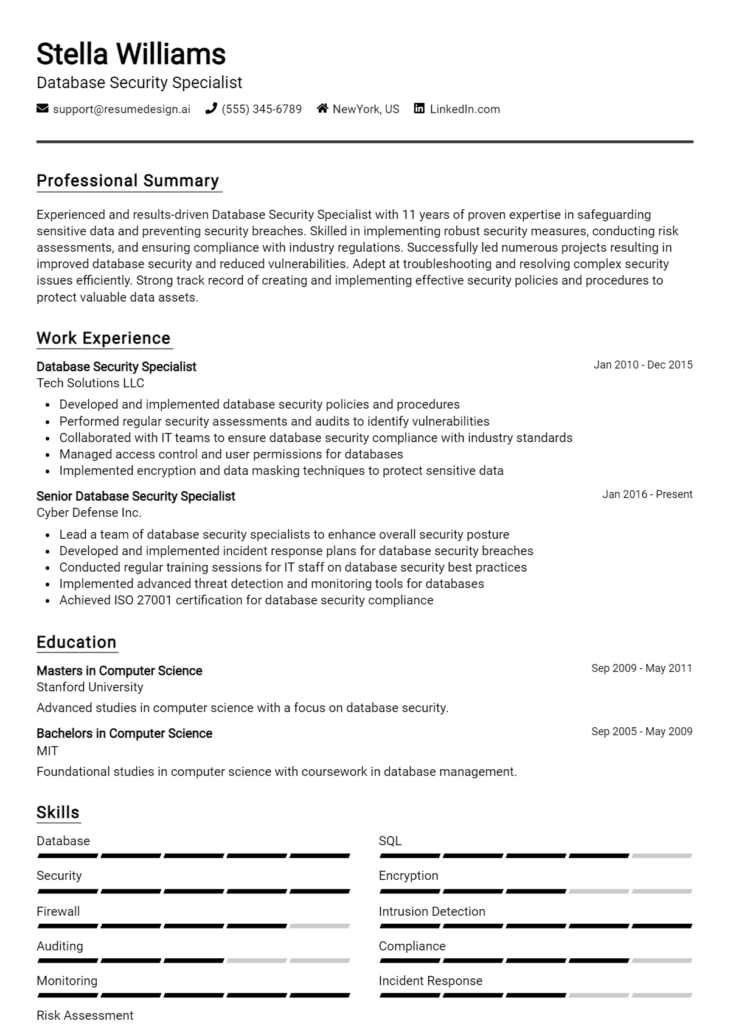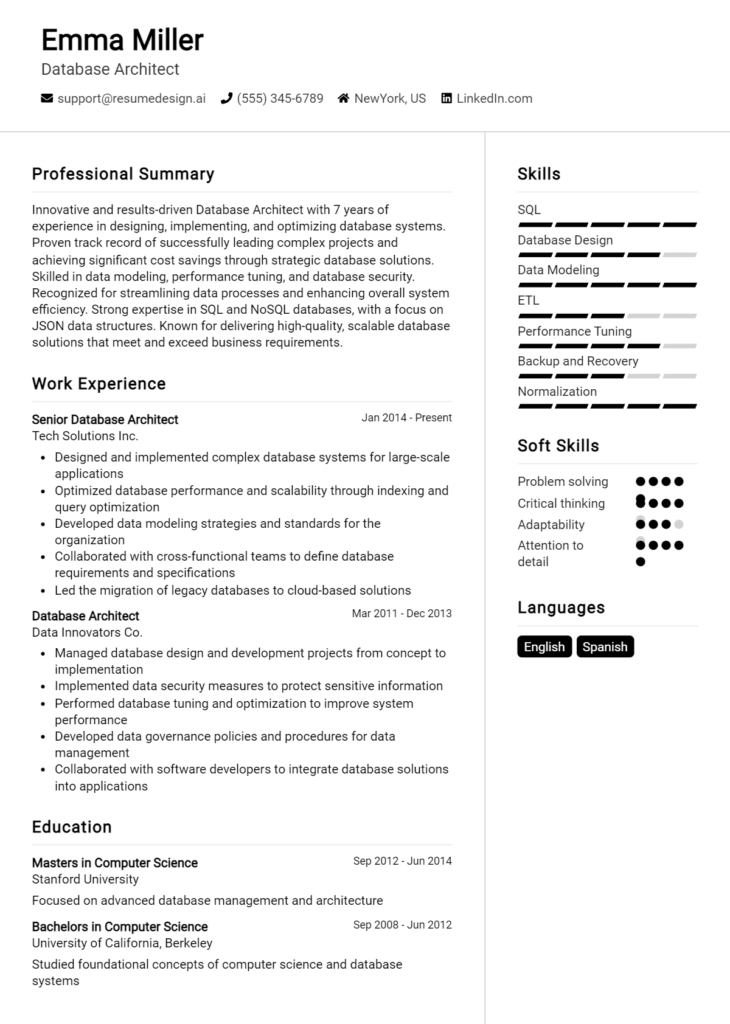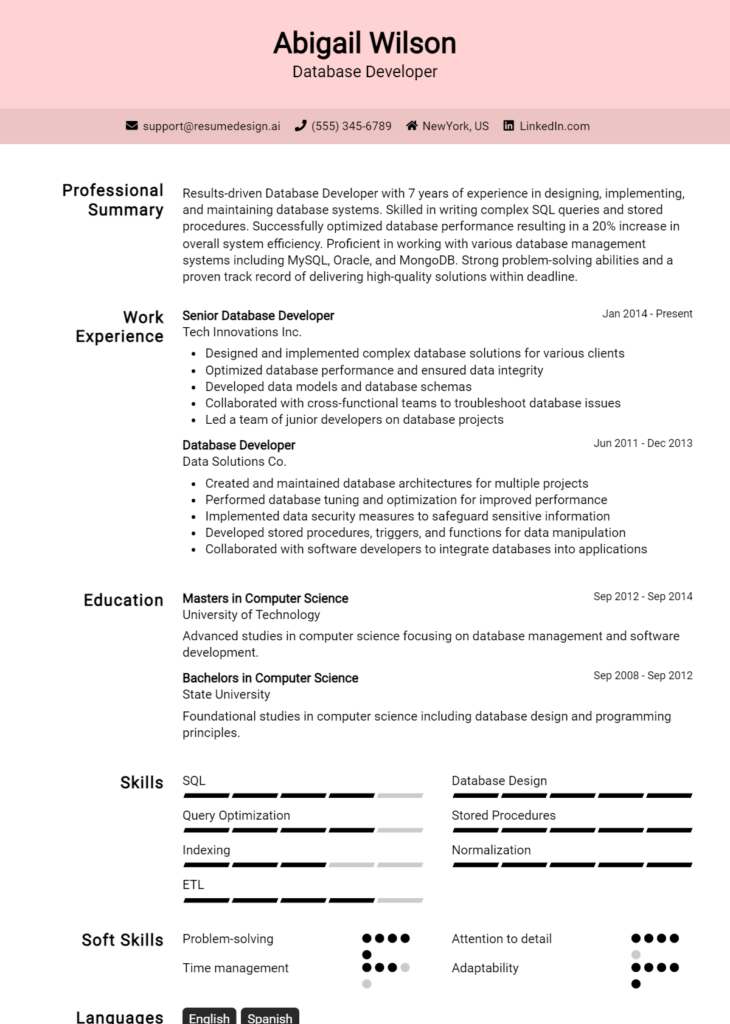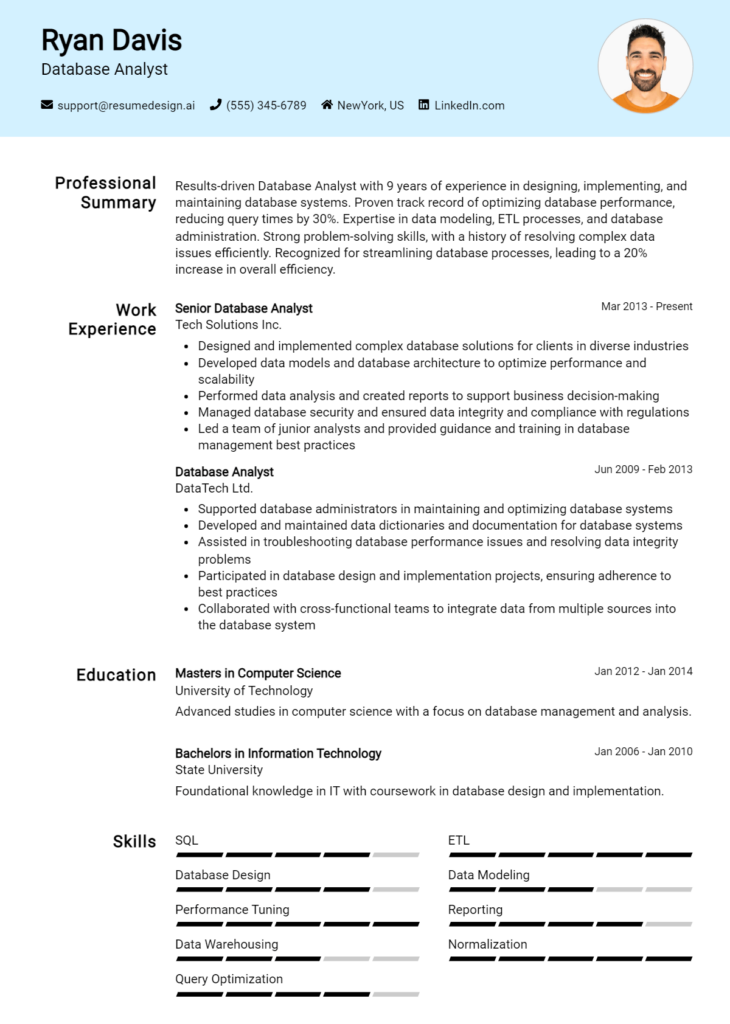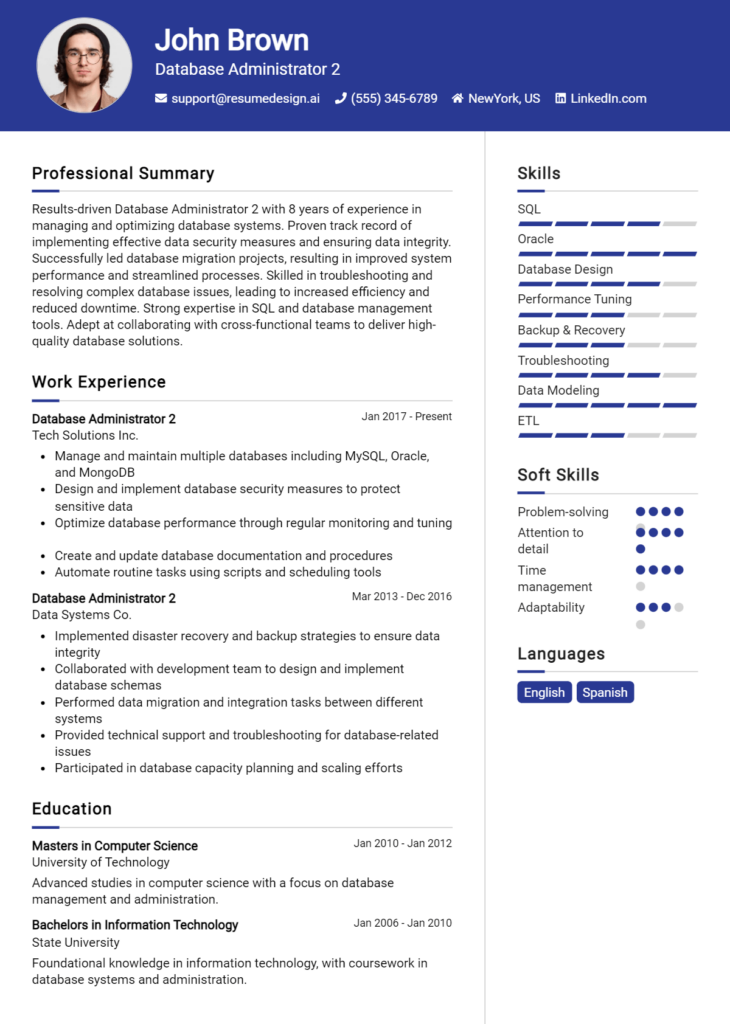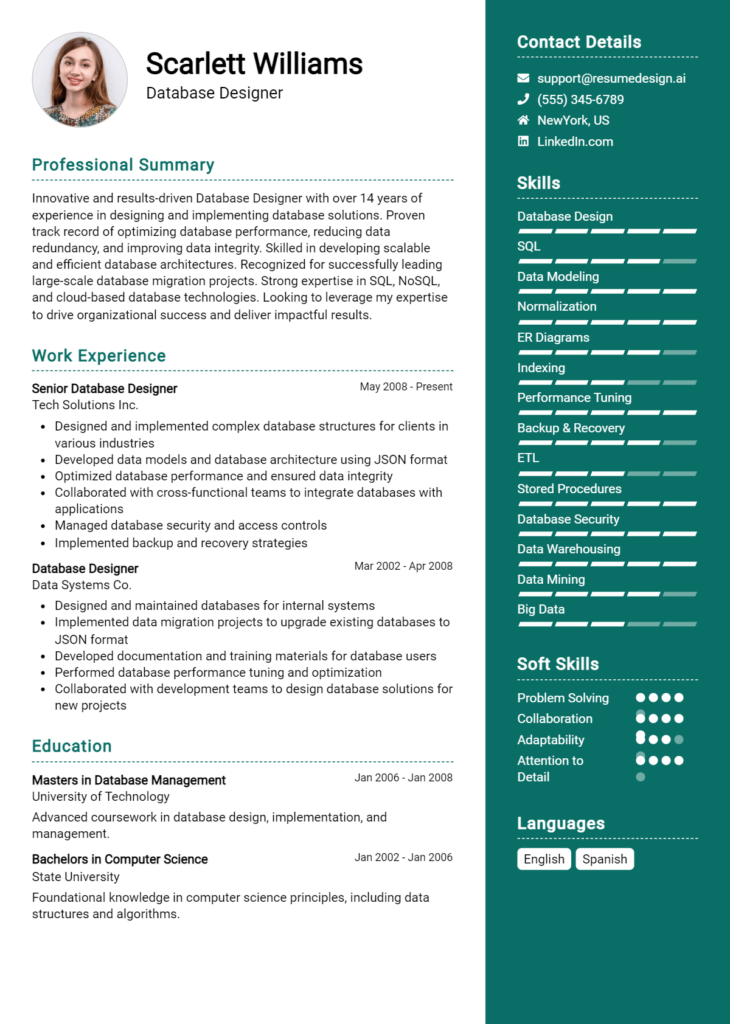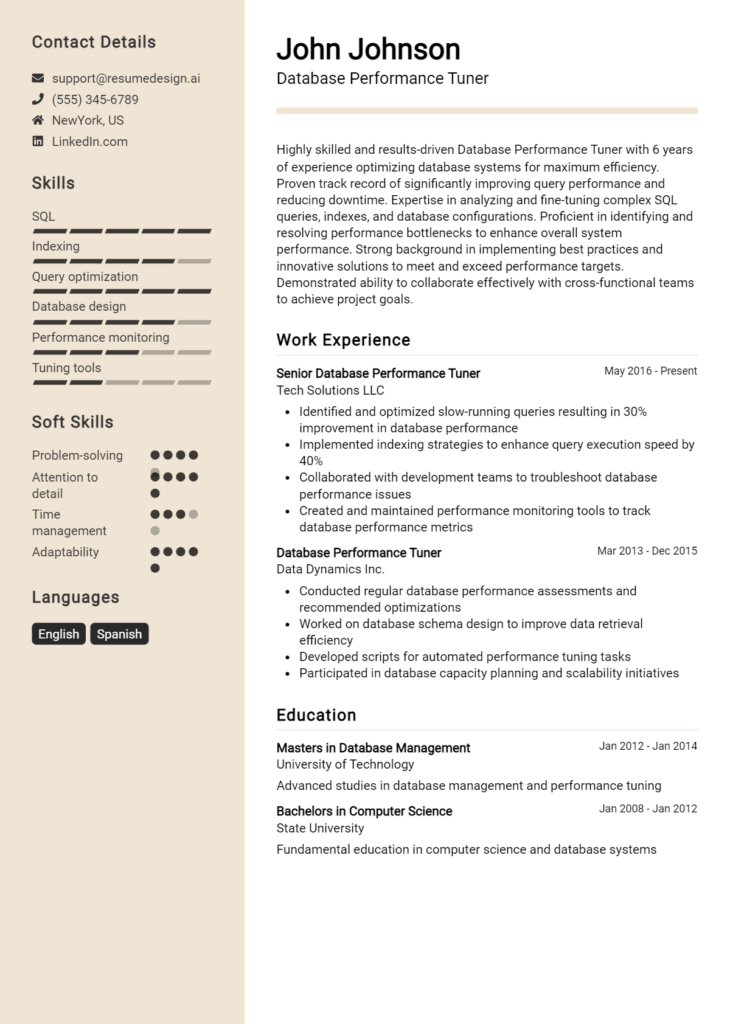Database Partitioning Specialist Core Responsibilities
A Database Partitioning Specialist plays a crucial role in optimizing data management across various departments by implementing effective partitioning strategies. This position requires a blend of technical skills, operational insights, and robust problem-solving abilities. Specialists must collaborate with data architects, developers, and system administrators to enhance database performance and scalability. Their expertise directly contributes to organizational efficiency and data accessibility, making a well-structured resume essential for showcasing these qualifications and demonstrating alignment with the company’s goals.
Common Responsibilities Listed on Database Partitioning Specialist Resume
- Designing and implementing database partitioning strategies to improve performance.
- Analyzing data access patterns to optimize partitioning schemes.
- Collaborating with cross-functional teams to ensure seamless data flow.
- Monitoring database performance and making adjustments as needed.
- Performing data migration and ensuring data integrity during partitioning.
- Creating documentation for partitioning processes and best practices.
- Troubleshooting and resolving database partitioning issues.
- Conducting performance tuning and optimization of partitioned databases.
- Staying updated on database technologies and partitioning techniques.
- Training and mentoring team members on partitioning strategies.
- Evaluating and recommending tools for effective data partitioning.
High-Level Resume Tips for Database Partitioning Specialist Professionals
In the competitive landscape of database management, a well-crafted resume serves as a crucial tool for Database Partitioning Specialist professionals. It is often the first impression a candidate makes on a potential employer, making it essential to not only showcase technical skills but also highlight notable achievements. A resume should reflect a candidate's ability to optimize database performance and manage data effectively, both of which are critical in today’s data-driven world. In this guide, we will provide practical and actionable resume tips specifically tailored for Database Partitioning Specialist professionals, ensuring that your application stands out in a crowded field.
Top Resume Tips for Database Partitioning Specialist Professionals
- Tailor your resume to the specific job description by incorporating relevant keywords from the posting.
- Showcase your experience in database partitioning techniques and methodologies that align with the needs of the employer.
- Quantify your achievements, such as improvements in database performance or reductions in query processing time, to demonstrate your impact.
- Highlight industry-specific skills, such as proficiency in relevant database management systems (DBMS) and data warehouse technologies.
- Include certifications or training related to database management and partitioning to enhance your credibility.
- Utilize clear and concise language to describe your role in previous projects, focusing on your contributions and results.
- Incorporate a summary statement that captures your career highlights and expertise in database partitioning.
- Use bullet points for easy readability, ensuring that each point emphasizes a specific skill or achievement.
- Keep your resume to one or two pages in length, focusing on the most relevant experiences and avoiding unnecessary details.
- Proofread your resume for grammar and spelling errors, as attention to detail is vital in database management roles.
By implementing these tips, Database Partitioning Specialist professionals can significantly increase their chances of landing a job in the field. A targeted and polished resume not only demonstrates a candidate's qualifications but also reflects their commitment to excellence in data management, ultimately making a compelling case for their candidacy.
Why Resume Headlines & Titles are Important for Database Partitioning Specialist
In the competitive landscape of job applications, especially for specialized roles such as a Database Partitioning Specialist, the importance of resume headlines and titles cannot be overstated. A well-crafted headline serves as the first impression for hiring managers, allowing them to quickly gauge a candidate's relevance and qualifications. By summarizing key skills and experiences in a concise and impactful phrase, a strong headline can capture attention and encourage further exploration of the resume. It should be specific, relevant, and tailored to the job being applied for, demonstrating to employers that the candidate is a perfect fit for the role.
Best Practices for Crafting Resume Headlines for Database Partitioning Specialist
- Keep it concise: Aim for one impactful phrase that encapsulates your core qualifications.
- Be role-specific: Tailor your headline to reflect the unique requirements of a Database Partitioning Specialist.
- Highlight key skills: Include essential skills such as data management, performance optimization, or database architecture.
- Use keywords: Incorporate relevant industry terms to align with job descriptions and ATS requirements.
- Showcase accomplishments: If possible, hint at notable achievements or contributions in your headline.
- Maintain professionalism: Use clear and professional language that reflects your expertise.
- Avoid clichés: Steer clear of overused phrases that do not add value to your resume.
- Revise regularly: Update your headline as your skills and experiences evolve or as you target different roles.
Example Resume Headlines for Database Partitioning Specialist
Strong Resume Headlines
"Expert Database Partitioning Specialist with 5+ Years in Performance Optimization and Scalability"
“Data Management Professional Specializing in Advanced Partitioning Techniques for High-Volume Databases”
“Results-Driven Database Partitioning Expert with Proven Success in Enhancing Query Performance”
Weak Resume Headlines
“Database Specialist”
“Experienced IT Professional”
Strong headlines are effective because they provide a clear snapshot of the candidate's expertise, immediately conveying their value to potential employers. They are specific and tailored to the role, making it easy for hiring managers to see a candidate’s fit for the Database Partitioning Specialist position. In contrast, weak headlines tend to be vague or overly generic, failing to highlight unique qualifications or skills. This lack of specificity can cause candidates to blend in with the competition, missing the opportunity to stand out in a crowded job market.
Writing an Exceptional Database Partitioning Specialist Resume Summary
A well-crafted resume summary is crucial for a Database Partitioning Specialist as it serves as the first impression to hiring managers. This brief yet powerful introduction encapsulates the candidate's key skills, relevant experience, and significant accomplishments that align with the job role. A strong summary not only captures attention but also effectively communicates the candidate's value proposition, making it easier for hiring managers to see their potential fit within the organization. To be effective, the summary should be concise, impactful, and specifically tailored to the position being applied for, ensuring that it resonates with the unique requirements of the job description.
Best Practices for Writing a Database Partitioning Specialist Resume Summary
- Quantify achievements: Use numbers to highlight the impact of your work, such as performance improvements or cost savings.
- Focus on relevant skills: Highlight key skills that are directly related to database partitioning, such as SQL optimization and data management.
- Tailor the summary: Customize your summary for each job application to reflect the specific requirements and keywords from the job description.
- Keep it concise: Aim for 3-5 sentences that pack a punch without overwhelming the reader.
- Use action verbs: Start sentences with strong action verbs to convey confidence and proactivity.
- Include industry keywords: Incorporate terminology relevant to database partitioning and data architecture to catch the attention of applicant tracking systems (ATS).
- Showcase problem-solving abilities: Highlight your capacity to address challenges and improve database performance through partitioning strategies.
- Demonstrate continuous learning: Mention any ongoing education or certifications related to database technologies that enhance your qualifications.
Example Database Partitioning Specialist Resume Summaries
Strong Resume Summaries
Dynamic Database Partitioning Specialist with over 7 years of experience optimizing large-scale databases for Fortune 500 companies. Achieved a 40% reduction in query response time through innovative partitioning strategies, resulting in enhanced system performance and user satisfaction.
Results-driven Database Partitioning Specialist adept at designing and implementing partitioning solutions that improved data retrieval efficiency by 30%. Possess advanced skills in SQL, performance tuning, and data modeling, contributing to significant cost savings in cloud storage.
Experienced Database Partitioning Specialist with a proven track record of managing complex data environments. Successfully partitioned a multi-terabyte database, reducing maintenance costs by 25% and downtime by 15%, while enhancing overall data accessibility.
Weak Resume Summaries
I am a Database Partitioning Specialist with some experience in database management and optimization.
Enthusiastic database professional looking for opportunities in partitioning and performance improvement.
The examples provided highlight the distinction between strong and weak resume summaries. The strong summaries effectively quantify achievements, showcase specific skills, and directly relate to the role of a Database Partitioning Specialist, making them impactful and relevant. In contrast, the weak summaries are vague, lack quantifiable outcomes, and fail to convey the candidate's unique value, making them less likely to capture the attention of hiring managers.
Work Experience Section for Database Partitioning Specialist Resume
The work experience section of a Database Partitioning Specialist resume is crucial as it provides potential employers with insight into the candidate's technical skills, leadership capabilities, and ability to deliver high-quality results in complex environments. This section not only highlights the candidate’s hands-on experience with database partitioning techniques but also emphasizes their proficiency in managing teams and projects effectively. By quantifying achievements and aligning their experience with industry standards, candidates can demonstrate their value to prospective employers and differentiate themselves in a competitive job market.
Best Practices for Database Partitioning Specialist Work Experience
- Clearly outline relevant technical skills and tools used in previous roles.
- Quantify achievements with specific metrics (e.g., performance improvements, cost reductions).
- Highlight leadership roles in projects, showcasing team management and mentoring.
- Detail collaborative efforts with cross-functional teams to solve complex database issues.
- Align experience descriptions with industry standards and best practices for database management.
- Include specific examples of successful database partitioning implementations.
- Use action verbs to convey a sense of initiative and impact.
- Focus on continuous learning and application of new database technologies.
Example Work Experiences for Database Partitioning Specialist
Strong Experiences
- Led a team of 5 in the implementation of a partitioning strategy that reduced query response times by 40%, enhancing overall system performance.
- Designed and executed a database partitioning project that resulted in a 30% decrease in storage costs and improved data management efficiency.
- Collaborated with application developers to optimize SQL queries for partitioned databases, achieving a 25% improvement in application speed.
- Conducted training sessions for junior staff on best practices in database partitioning, increasing team competency and project throughput by 15%.
Weak Experiences
- Worked on database projects that involved partitioning.
- Helped team members with various database tasks.
- Performed general database management duties.
- Participated in discussions about database partitioning strategies.
The examples listed as strong experiences demonstrate clear, quantifiable outcomes and a proactive approach to technical leadership and collaboration within teams. They provide specific metrics that highlight the impact of the candidate’s contributions, effectively showcasing their expertise and value. In contrast, the weak experiences are vague, lacking detail and measurable results, which diminishes their effectiveness in portraying the candidate's qualifications and skills in database partitioning.
Education and Certifications Section for Database Partitioning Specialist Resume
The education and certifications section of a Database Partitioning Specialist resume is crucial for establishing the candidate's qualifications and expertise in the field. This section serves to highlight the academic background, industry-relevant certifications, and commitment to continuous learning that are essential for success in database management and partitioning. By providing detailed information on relevant coursework, certifications, and specialized training, candidates can significantly enhance their credibility and demonstrate their alignment with the specific requirements of the job role.
Best Practices for Database Partitioning Specialist Education and Certifications
- Include only relevant degrees and certifications that pertain to database management and partitioning.
- Detail specific coursework that directly applies to database design, optimization, and partitioning strategies.
- Highlight industry-recognized certifications from reputable organizations, such as Oracle, Microsoft, or AWS.
- Showcase any specialized training or workshops that focus on advanced database technologies.
- Maintain a clear and organized format, ensuring easy readability for recruiters.
- Update this section regularly to reflect recent achievements and certifications.
- Include year of completion for degrees and certifications to demonstrate currency in the field.
- Use action verbs to describe achievements or highlights within your educational background.
Example Education and Certifications for Database Partitioning Specialist
Strong Examples
- Master of Science in Computer Science, specializing in Database Management, University of XYZ, 2022
- Oracle Certified Professional (OCP) in Database Administration, 2023
- Certified Data Management Professional (CDMP), Data Management Association, 2021
- Coursework: Advanced Database Design, Performance Tuning, and Partitioning Strategies, University of XYZ
Weak Examples
- Bachelor of Arts in English Literature, University of ABC, 2010
- Certified Personal Trainer, Fitness Association, 2019
- Introduction to SQL, Online Course, 2015
- High School Diploma, Anywhere High School, 2008
The examples provided illustrate the difference between strong and weak qualifications for a Database Partitioning Specialist. Strong examples demonstrate relevant degrees and certifications that align with the role's requirements, showcasing advanced skills and knowledge in database management. In contrast, weak examples indicate a lack of pertinent educational background or outdated certifications that do not apply to the field, which can undermine the candidate's credibility and suitability for the position.
Top Skills & Keywords for Database Partitioning Specialist Resume
In today's data-driven world, the role of a Database Partitioning Specialist is crucial for optimizing database performance and ensuring efficient data management. A well-crafted resume that highlights relevant skills can set candidates apart in a competitive job market. Skills not only reflect a candidate’s technical expertise but also demonstrate their ability to navigate complex challenges, work collaboratively, and adapt to evolving technologies. Emphasizing both hard and soft skills on a resume is essential for showcasing a well-rounded professional profile that appeals to potential employers.
Top Hard & Soft Skills for Database Partitioning Specialist
Soft Skills
- Analytical Thinking
- Problem-Solving
- Attention to Detail
- Communication Skills
- Team Collaboration
- Time Management
- Adaptability
- Critical Thinking
- Customer Service Orientation
- Conflict Resolution
Hard Skills
- SQL Proficiency
- Database Design and Architecture
- Partitioning Techniques (Range, List, Hash)
- Performance Tuning and Optimization
- Data Modeling
- Backup and Recovery Solutions
- Familiarity with Database Management Systems (DBMS) like Oracle, SQL Server, MySQL
- Understanding of Indexing Strategies
- ETL Processes (Extract, Transform, Load)
- Knowledge of Cloud Database Solutions (e.g., AWS, Azure)
By incorporating these essential skills into your resume, along with detailed work experience, you can effectively convey your qualifications and readiness for the role of a Database Partitioning Specialist.
Stand Out with a Winning Database Partitioning Specialist Cover Letter
Dear [Hiring Manager's Name],
I am writing to express my enthusiasm for the Database Partitioning Specialist position at [Company Name], as advertised on [Where You Found the Job Listing]. With [X years] of experience in database management and optimization, coupled with my expertise in partitioning strategies, I am excited about the opportunity to contribute to your team and enhance your database performance. My background in [specific database technologies or environments] has equipped me with a deep understanding of how effective partitioning can significantly improve data retrieval times and overall system efficiency.
In my previous role at [Previous Company Name], I successfully implemented partitioning solutions that reduced query response times by up to [X%]. I accomplished this by analyzing existing database structures and identifying key areas for improvement. My hands-on experience with [specific databases, e.g., Oracle, SQL Server, MySQL] allowed me to tailor partitioning strategies that align with organizational goals, ensuring that the databases not only performed optimally but also remained scalable as data volumes increased. I have also collaborated closely with development teams to establish best practices for data management, ensuring that partitioning methods were integrated seamlessly into the overall data architecture.
I am particularly drawn to [Company Name] because of its commitment to innovation and excellence in data management. I admire your [mention any specific project, value, or achievement of the company], and I am eager to bring my skills in partitioning and performance tuning to help support your vision. I am confident that my proactive approach and analytical mindset will allow me to make a meaningful impact on your database operations.
Thank you for considering my application. I look forward to the opportunity to discuss how my experience and skills can contribute to the success of [Company Name]. Please feel free to contact me at [Your Phone Number] or [Your Email Address] to arrange a discussion at your earliest convenience.
Sincerely,
[Your Name]
Common Mistakes to Avoid in a Database Partitioning Specialist Resume
When crafting a resume as a Database Partitioning Specialist, it's crucial to present your skills and experiences effectively to stand out in a competitive job market. However, there are common pitfalls that candidates often encounter that can detract from their qualifications. Avoiding these mistakes will not only enhance the clarity of your resume but also increase your chances of landing an interview. Here are some of the most frequent errors to steer clear of:
Lack of Specificity: Failing to provide specific examples of partitioning techniques or technologies you've worked with can make your resume vague. Clearly mention the types of databases and partitioning methods you have experience with.
Ignoring Keywords: Many companies use Applicant Tracking Systems (ATS) to filter resumes. Not including relevant keywords related to database partitioning can lead to your resume being overlooked. Research job descriptions to identify key terms.
Overcomplicating Technical Jargon: While it’s important to demonstrate technical expertise, using overly complex jargon may confuse hiring managers. Aim for clear, concise language that conveys your knowledge without alienating non-technical readers.
Neglecting Metrics and Results: Simply listing responsibilities without demonstrating the impact of your work can weaken your resume. Include quantifiable achievements, such as performance improvements or cost savings resulting from your partitioning strategies.
Not Tailoring the Resume: Sending the same generic resume for every job application can diminish your chances. Tailor your resume to highlight the skills and experiences most relevant to each specific role.
Poor Formatting: A cluttered or unprofessional format can make your resume difficult to read. Use clear headings, bullet points, and consistent font choices to create an organized appearance.
Omitting Soft Skills: While technical skills are vital, neglecting to mention relevant soft skills like problem-solving, teamwork, and communication can be a missed opportunity. Employers value candidates who can collaborate effectively within teams.
Failing to Update Regularly: Not keeping your resume current with your latest experiences and skills can be detrimental. Regularly update it to reflect your most recent achievements and any new technologies you’ve learned.
Conclusion
As a Database Partitioning Specialist, your expertise in optimizing database performance through effective partitioning strategies is crucial for organizations striving for efficiency and scalability. Throughout this article, we have highlighted the importance of understanding various partitioning techniques, including horizontal and vertical partitioning, and the essential factors to consider when implementing these methods.
Additionally, we discussed the impact that well-structured partitioning can have on query performance, maintenance, and overall database management. The role requires a blend of technical skills and strategic thinking to ensure that databases are not only functional but also optimized for future growth.
Now that you are aware of the key responsibilities and skills required for this role, it’s time to reflect on your own qualifications and experiences. We encourage you to review your Database Partitioning Specialist resume to ensure it accurately showcases your skills and achievements.
To assist you in this process, consider utilizing the following resources:
- Explore a variety of resume templates to find a design that suits your professional style.
- Use the resume builder to create a polished resume effortlessly.
- Check out resume examples for inspiration and guidance on how to present your experience effectively.
- Don’t forget to complement your resume with a strong application by using our cover letter templates to articulate your passion and fit for the role.
Take action now and enhance your job application materials to stand out in the competitive field of database management!

